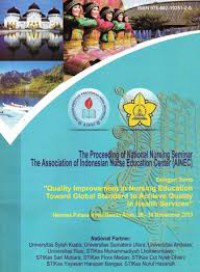
Prosiding
Model of Family Health Behaviors Receiver Jamkesmas
To prevent the worse health condition especially for poor society because of monetary crises since 1997, the government launched Public Health Assurance or Jamkesmas (Jaminan Kesehatan Masyarakat). This program gave health service freely to the poor society at the choosen health service places. However, the advantages of this program were still low. It was around 39.8 percent (Public Health Department, 2011). Beside, based on monitoring, poor society behavior didnt support this program also. They showed unhealthy behavior. The goal of this research was to develope health behavior model of Jamkesmas recipients in Kediri City East Java, also the factors which influenced them. This research was Observation Research with crosssectional design. There were 270 respondents taken by using two stage cluster sampling technique. The data were gathered by valid and reliable questionnaire. After that, the data were analyzed descriptively by using binary logistic regression statistic analysis to test model feasibility and regression coefficient. The results of research showed that ost of Jamkesmas recipients had unhealthy behavior, many sick complaints and worries, ut they didnt go to the health services which were refered. This research also found that ck complaint level (need) was influenced by dwelling ownership status, family status, he th value and knowledge about disease and Jamkesmas at predisposing factors, also sp ding money for food at enabling factor, and health behavior practice. Health behavior practice of Jamkesmas recipients and their family were influenced by education level, health value at predispo ng factor and spending money for cigarette and perception toward health service at abling factor. As well as health service utilization was influenced by worry level of t e sickness that they felt and spending money for food.
Availability
No copy data
Detail Information
- Series Title
-
The Proceeding of National Nursing Seminar The Association of Indonesian Nurse Education Center (AINEC) : Quality Improvement in Nursing Education Toward Global Standard to Achieve Quality in Health
- Call Number
-
(051) 610.5 ASO t
- Publisher
- Jakarta : AIPNI., 2013
- Collation
-
Hlm. 26
- Language
-
English
- ISBN/ISSN
-
978-602-19251-2-6
- Classification
-
(051) 610.5 ASO t
- Content Type
-
-
- Media Type
-
-
- Carrier Type
-
-
- Edition
-
-
- Subject(s)
- Specific Detail Info
-
-
- Statement of Responsibility
-
-
Other version/related
No other version available
File Attachment
Comments
You must be logged in to post a comment
 Computer Science, Information & General Works
Computer Science, Information & General Works  Philosophy & Psychology
Philosophy & Psychology  Religion
Religion  Social Sciences
Social Sciences  Language
Language  Pure Science
Pure Science  Applied Sciences
Applied Sciences  Art & Recreation
Art & Recreation  Literature
Literature  History & Geography
History & Geography